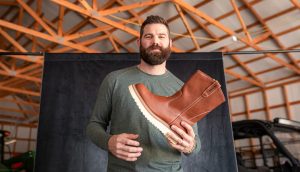
A lot of new media leaders have taken the reins of their agencies since the start of the pandemic. So, Lauren Richards thought it would be a good idea to sit down with them to learn how they have been leading their companies through the uncertainty of the last three years, their plans for challenges to come and, quite simply, to help readers get to know the new faces of the industry in Canada. Check back for a new profile every Thursday, and read previous entries in the series here.
I’m at Stock Restaurant, on a Sunday morning of all times, to have a beverage and a chat over brunch with Lesley Conway, one of the many industry media notables who has come into their leadership positions during the pandemic.
Conway, a very well-known media industry sales leader, became CEO of Mindshare Canada in May 2022, replacing Devon MacDonald (who is now president of Cairns Oneil).
Before she went off on business to San Francisco to engulf herself in the world of financial media – the financial category is a key new business goal – she quickly offered to meet on the Sunday before so I could meet my deadline for this story. She’s that kind of a person.
You know when Conway is in the room. In addition to not being too far off from six feet tall, she has a presence and is never afraid to speak her mind. My kind of person.
She’s also very ambitious, not afraid of hard work and is passionate about the business. And after stints at the likes of Astral, Bell and CHUM, she’s excited about being back on the agency side, where she started her career when M2 was still known as Initiative. She’s also a wee bit of fun from time to time.
She’s leading the almost 200 member Canadian Mindshare group, who are based mostly in Toronto, with a secondary office in Montreal.
Running a large media agency is a daunting task, between competition from other agencies, the demands of the job and the long hours. So it was natural to ask Conway if she had any reservations coming into the role.
“I don’t know that I had reservations, because I knew that it was a big commitment,” Conway says. “I sat down with my guy and my son and said, ‘if I do this, this is what it’s going to mean. And you’ve had a lot of time with me through the pandemic, are you okay with that?’ So I kind of went in eyes wide open on the personal side of what the demands would be.”
In the year before Conway joined, Mindshare had a tough year marked by major client losses, such as Walmart and Unilever, mostly following global agency reviews. Now that she has hit the ground, Conway says Mindshare is at a place where it can grow as a company again.
“We picked up the Reckitt business, that was one of the first big wins that we’ve had,” she says. Last year, it also won General Mills and retained Rogers after dedicated agency Theo was dissolved. “My first seven months have really been about establishing what do we do really well, what are our points of differentiation are and what we need to do a little differently to go forward into the future and deliver on client expectations. I think clients are really looking for a much deeper partnership now.”
When I probe about what Mindshare’s differentiation is – what is the Mindshare “mind” – Lesley talks about the importance of intimately understanding every individual client’s business and practicing with “intentional media”: media strategies and decisions that are based on client’s needs and ensuring complementary communication avenues to existing client engagement, especially as it relates to a social media voice.
When I ask how Mindshare is working now – is there mandated time in office, or any new work from home policies? – she tells me that the senior management team has had a new, consistent schedule in place since October: They are in Tuesday to Thursday and prioritizing collective gathering and collaboration. But no specific expectations have been placed on staff, hoping everyone is adult about it and ensures there is both in-person time for staff development and collaboration, alongside productive individual time when working at home. Further expectations may well come globally in the new year: apparently, about 65% of staff are in office globally and less than 15% in North America.
“Nobody’s career has really grown sitting on a couch on a laptop,” she says, though she doesn’t want to mandate rules and expectations, opting instead to lead by example. “Interestingly, more than half our staff have started in the pandemic, including [GroupM Canada CEO] Kevin Johnson’s total senior management team. But I think there are ways of socializing things as opposed to mandating things. How much do you ask for at any one time? What is the most important thing to ask for? It doesn’t feel like you’re treating people like adults.”
When we discuss what’s most important for the media industry to fix at the moment, she offered several important rallying cries.
The need to make it “fun again” was near the top. Attending events is really all about networking and getting to know each other better so we can help each other more effectively. She also believes it’s an important investment of time for the product and innovation. And most significantly she says we need to ‘stop commoditizing ourselves and to stop commoditizing our value.’
When I conclude by asking what advice she would give the Lesley of 20 years ago, she confidently ends with “never be afraid to reinvent yourself and own your truth.” Perhaps that means it took her a little longer to get back to the agency side, but I’m glad she has – and she sure is owning it.























